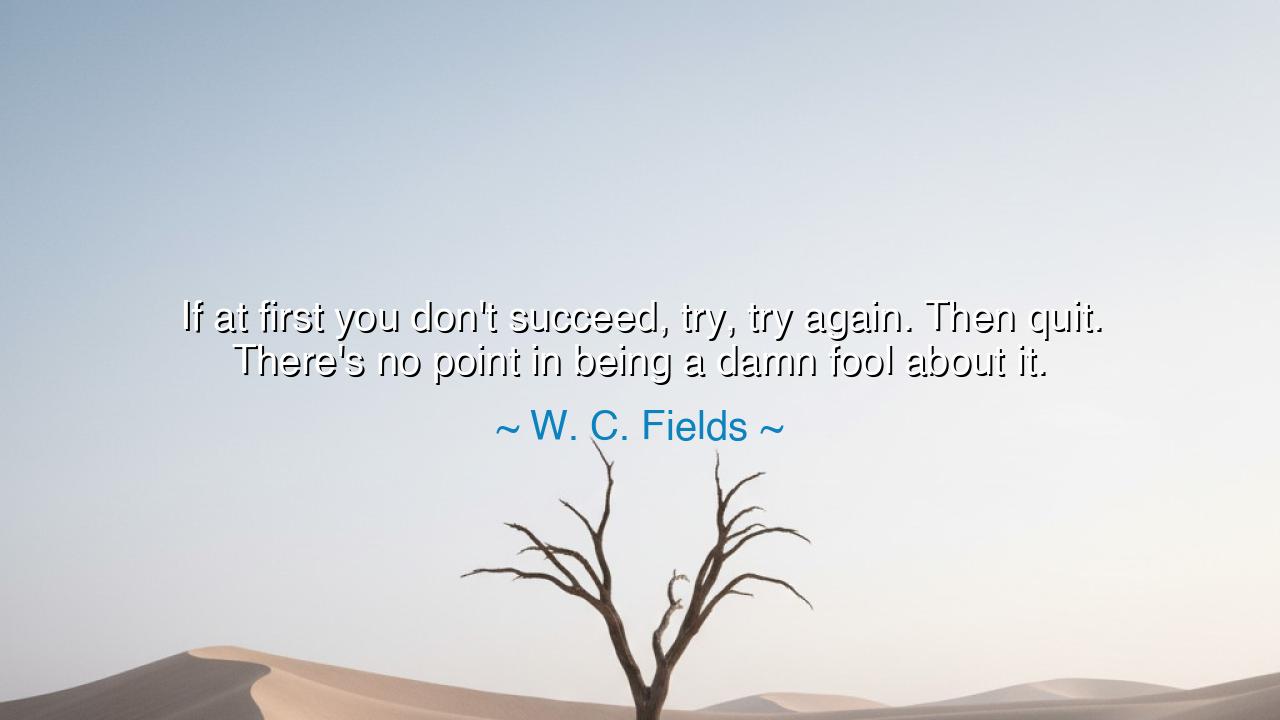
If at first you don't succeed, try, try again. Then quit.
If at first you don't succeed, try, try again. Then quit. There's no point in being a damn fool about it.






Gather around, O children of the future, and listen to the wise words of W. C. Fields, who said, "If at first you don't succeed, try, try again. Then quit. There's no point in being a damn fool about it." These words, though wrapped in humor and irony, carry within them a deeper truth about the nature of persistence and wisdom. Fields speaks not only of the importance of trying again but of knowing when to stop, to accept defeat, and to move on. In his jest, there is an insight that many fail to grasp: the balance between perseverance and discernment.
At first glance, Fields’ words seem contradictory. How can one try again if the act of quitting is advised after? The deeper meaning, however, is clear. Life often demands of us that we face challenges and setbacks, and the natural instinct is to keep trying, to continue pushing forward in the face of failure. Persistence, the ancient virtue, tells us to never give up, to continue striving even when the road is long and the end seems distant. But Fields reminds us that there is also a wisdom in knowing when to stop, to step back, and to recognize when our efforts are in vain.
This truth has been passed down since the time of the great warriors and philosophers. Consider the tale of Alexander the Great, who, after years of relentless conquest, reached the banks of the Indus River. His army, weary and worn, refused to march further, and despite his great ambition, Alexander accepted their decision, understanding that persistence does not mean forcing oneself into certain failure. In this moment, Alexander's wisdom lay not in relentless pursuit, but in understanding when the journey had reached its limit. Even the greatest of warriors must sometimes know when to quit and seek a new path.
Similarly, think of Thomas Edison, who famously failed countless times before inventing the light bulb. His story is often quoted as a model of unyielding persistence, where each failure was a step toward success. However, Edison’s persistence was not blind; he was able to adapt, to change course when necessary. The line between determination and folly is fine, and Edison knew when to pivot, when to rethink his approach. He did not continue with an idea that wasn’t working indefinitely. He persisted until he found a method that did work, yet he understood the wisdom of adaptation, the importance of knowing when a strategy no longer served the goal.
O children, take heed: persistence is indeed a powerful tool, but it must be tempered with wisdom. There is a time for grit, and there is a time for grace—the grace to know when to step back, to evaluate, and to change direction. This is the balance that life asks of us. The warrior who fights on without reflection is a fool, while the one who faces failure, learns from it, and adapts is the one who becomes wise. Fields’ words challenge us to engage with failure not as a sign of defeat, but as a signal to reassess our approach.
Consider the ancient sculptor who labors for days upon a block of marble, chipping away at it with relentless effort, only to realize that the shape he is carving is imperfect. Does he continue to chip away at the same flawed stone, or does he change his direction, choosing a new stone, a new method? The artist does not persist blindly; he knows that to continue on a path that yields nothing is to waste time and energy. Wisdom, therefore, lies in the ability to recognize when a course is futile and to embrace the courage to start anew.
The lesson, O children, is clear: in life, you will face many failures, many moments when it seems as though the road ahead is impossible. In these moments, you must gather the strength to try again, to push forward with determination. But also remember this: wisdom lies in knowing when to stop, in knowing when to reassess and shift your path. Success is not measured by how many times you try, but by how you learn, adapt, and move forward with clarity and purpose.
Therefore, O children, embrace both persistence and discernment. Persist until you have given your best, but do not cling to folly. Recognize when a new path calls to you, and do not be afraid to quit what no longer serves your growth. In this balance, you will find the path to true success, where wisdom and effort come together to shape your journey.






AAdministratorAdministrator
Welcome, honored guests. Please leave a comment, we will respond soon